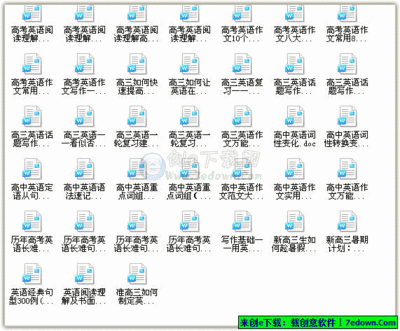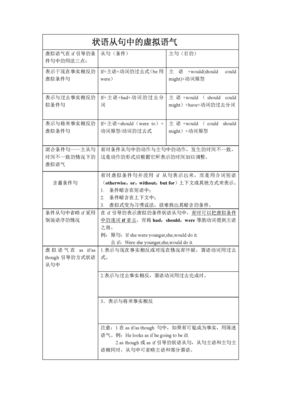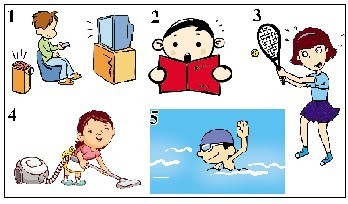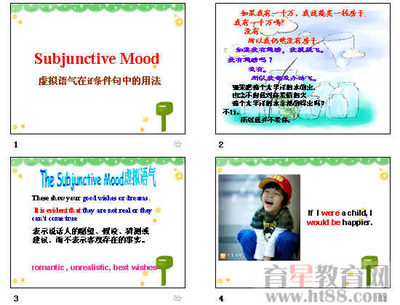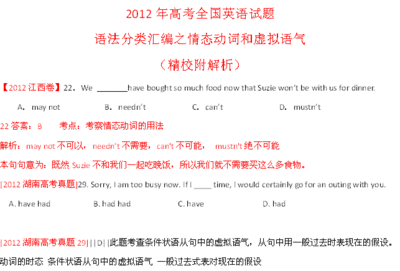包含条件从句的句子叫条件句。条件句有两类:一类是真实条件句(Firstconditional),一类是非真实条件句(SecondConditional)。如果假设的情况是有可能发生的,就是真实条件句;如果是纯属假设情况或是不可能发生或可能性不大的情况,则是非真实条件句。
1.真实条件句,可用if和unless引导
1)一个动作发生,另一动作随之发生
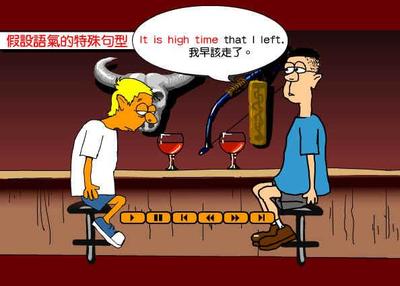
I’ll lend Peter the money if he needsit.
Ifhe has time, he will come.
Ifhe doesn’t come before 12 o’clock, we won’t wait for him.
I shall go tomorrow unless itrains.
I won’t go to her party unless I aminvited.
2)表示命令、建议或请求,这时的if等于when
If she telephones, let me know.
Give my love to Lawrence if you seehim.
3)will用于if从句中,不表示将来,而表示愿意或坚持的意思
If you will come thisway, I’ll take you to the manager’s office.
If you will get drunkevery night, it’s not surprising you feel ill.
2. 非真实条件句
非真实条件句包括虚拟条件句和错综时间条件句
1)虚拟条件句分三类,其结构列表如下:
条件从句 | 结果主句 | |
与现在事实相反 | If+主语+动词的一般过去时(be动词一般用were) | 主语+would/could/might+动词原形 |
与过去事实相反 | If+主语+had+过去分词 | 主语+would/could/might+have+过去分词 |
与将来事实相反 | If+主语+一般过去时 If+主语+were to If+主语+should+动词原形 | 主语+would/should/could/might +动词原形 |
If I become president, I’ll make all ofmy people live a happy life. (竞选总统的候选人这样说)
If I became president, I’d make all ofmy people live a happy life. (一个小学生这样说)
l以下与现在事实相反
He wouldn’t feel so cold if he wereindoors.
I am sorry I am very busy just now. IfI hade time, I would certainly go to the movie with you.
l以下与过去事实相反
If you had come here a little earlier,you would have met the pop star.
I don’t know what would have happenedif Jane hadn’t been able to speak Japanese.
l以下推测将来
If I were to do the work, I should doit in a different way.
If it should rain again, what elsecould we do?
2) 错综时间条件句
在错综时间条件句中,虚拟条件句和主句动作发生的时间不一致,因此,主句和从句的谓语动词要根据各自所指的不同时间选用适当的虚拟语气形式。
If you had spoken to him last time yousaw him, you would know what to do now.(过去→现在)
If I were you, I wouldn’t have missedthe film last night.(现在→过去)
条件句可分为真实条件句和非真实条件句。真实条件句表示句子所描述的事件是事实或在说话人看来可能实现的事情。
非真实条件句表示的条件与事实相反或不大可能实现的事情,即我们所说的虚拟语气。引导真实条件状语从句的连词
和词组有if, unless,once,as / so longas, so / as far as, in case, provided (that), providing (that),suppose (that), supposing (that),given (that),assuming (that),oncondition (that)等。 ●虚拟语气的使用范围及判断一、虚拟语气表示一种不能实现的假设。该语法主要用于if条件状语从句。也可用于主语从句、表语从句、宾语从句等。二、if条件状语从句中虚拟语气的判断判断是真实条件句还是非真实条件句。只有在非真实条件句中才使用虚拟语气。通过句子意思,看假设的条件是否能够实现,能够实现是真实条件句,不能使用虚拟语气;假设的条件不能实现则是非真实条件句,要用虚拟语气。判断这个假设是与哪个事实相反。通常有三种情况:①与过去事实相反。②与现在事实相反。③与将来事实可能相反。 三、“后退一步法”后退一步法是指在准确地判断了该句与哪一事实相反后,按虚拟语气的后退一步法处理从句谓语动词的时态。即:在非真实条件状语从句中,谓语动词按正常情况“后退一步”。也就是:①与过去事实相反,在从句中用过去完成时形式表示。 ②与现在事实相反,在从句中用过去一般时形式表示。③与将来事实可能相反,在从句中用过去将来时形式表示。 主句中则用情态动词would, should, could等加一个与从句一致的动词形式。 例:If I had come her yesterday, I would have seenhim. If I were a teacher, I would be strict with my students. If itshould snow tomorrow, they couldn’t go out. 四、注意事项 ①if条件句中如有were,should, had,可以省去if,并使用倒装语序。②在现代英语中if条件状与从句中的谓语动词如果是be其过去形式一般用were
 爱华网
爱华网